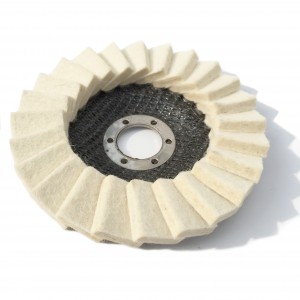In an era where environmental consciousness is at the forefront of global concerns, the manufacturing of wool felt wheels is undergoing a remarkable transformation towards sustainability. As industries and consumers alike increasingly prioritize eco – friendly products, manufacturers are innovating to reduce the environmental impact of wool felt wheel production while maintaining high – quality standards.
One of the key areas of focus in sustainable wool felt wheel manufacturing is the sourcing of raw materials. Traditionally, wool has been the primary material for these wheels. Now, manufacturers are turning to ethically and sustainably sourced wool. Some companies are partnering with local sheep farmers who adhere to strict animal welfare and environmental practices. By ensuring that the wool is obtained without causing harm to the animals or the environment, these manufacturers are not only promoting sustainable agriculture but also guaranteeing the quality and traceability of their raw materials.
In addition to raw material sourcing, advancements in production processes are also contributing to the sustainability of wool felt wheels. New manufacturing techniques are being developed to minimize waste generation. For example, some factories are using precision cutting methods that optimize the use of wool sheets, reducing the amount of scrap material. Moreover, recycling initiatives are on the rise. Leftover wool fibers from the production process are being collected and repurposed into other products, such as insulation materials or lower – grade felt products. This closed – loop system not only reduces waste sent to landfills but also creates additional value from what was previously considered waste.
Another significant aspect of sustainable wool felt wheel manufacturing is the reduction of energy consumption. Manufacturers are investing in energy – efficient machinery and adopting renewable energy sources in their production facilities. Solar panels are being installed on factory rooftops to power the manufacturing processes, and energy – saving technologies are being integrated into the equipment. These measures not only lower the carbon footprint of wool felt wheel production but also contribute to long – term cost savings for the manufacturers.
The push for sustainability in wool felt wheel manufacturing is also driven by the demand from end – users. Many industries, such as the automotive and electronics sectors, are now incorporating sustainability criteria into their procurement processes. They prefer to use wool felt wheels that are manufactured in an environmentally friendly manner. This has led to a growing market for “green” wool felt wheels, with companies that adopt sustainable practices gaining a competitive edge.
Furthermore, sustainable wool felt wheels are also becoming popular among DIY enthusiasts and hobbyists. As more people become aware of the environmental impact of their purchases, they are actively seeking out eco – friendly polishing tools. Manufacturers are responding to this trend by clearly labeling their sustainable products and educating consumers about the benefits of choosing environmentally friendly wool felt wheels.
In conclusion, the shift towards sustainable practices in wool felt wheel manufacturing is not only a response to environmental concerns but also a strategic move that benefits both the industry and the consumers. As technology and awareness continue to grow, we can expect to see even more innovative and sustainable solutions in the production of wool felt wheels in the future.

Post time: Jun-13-2025
